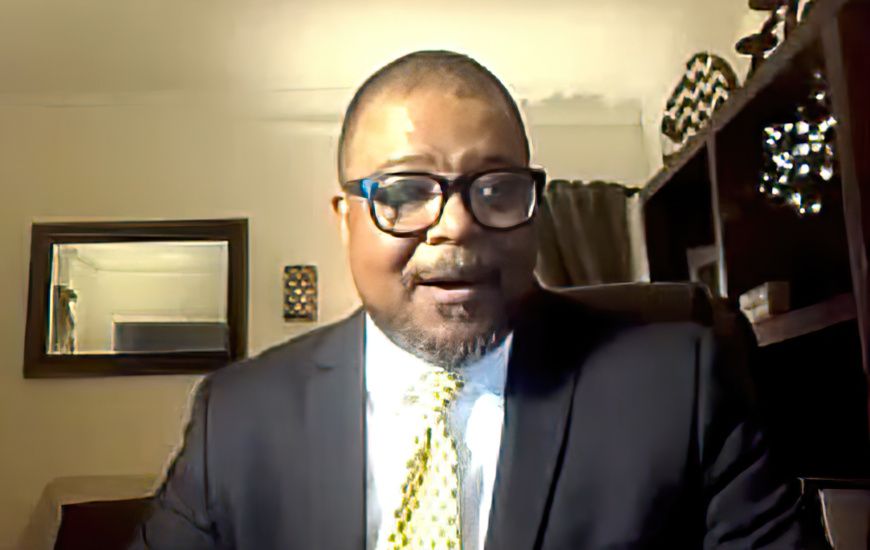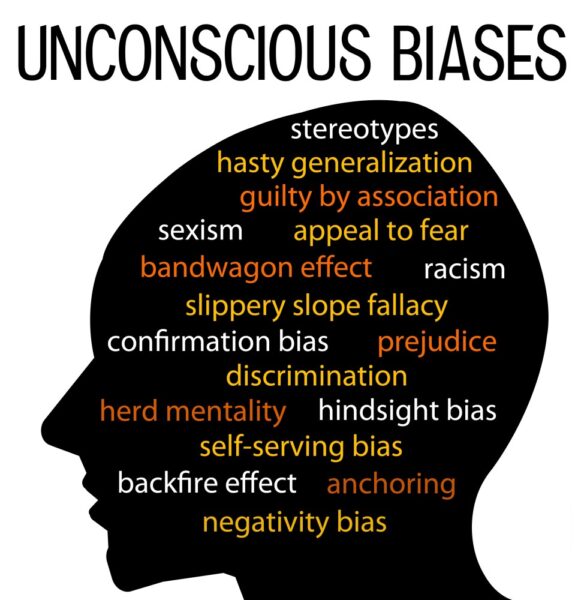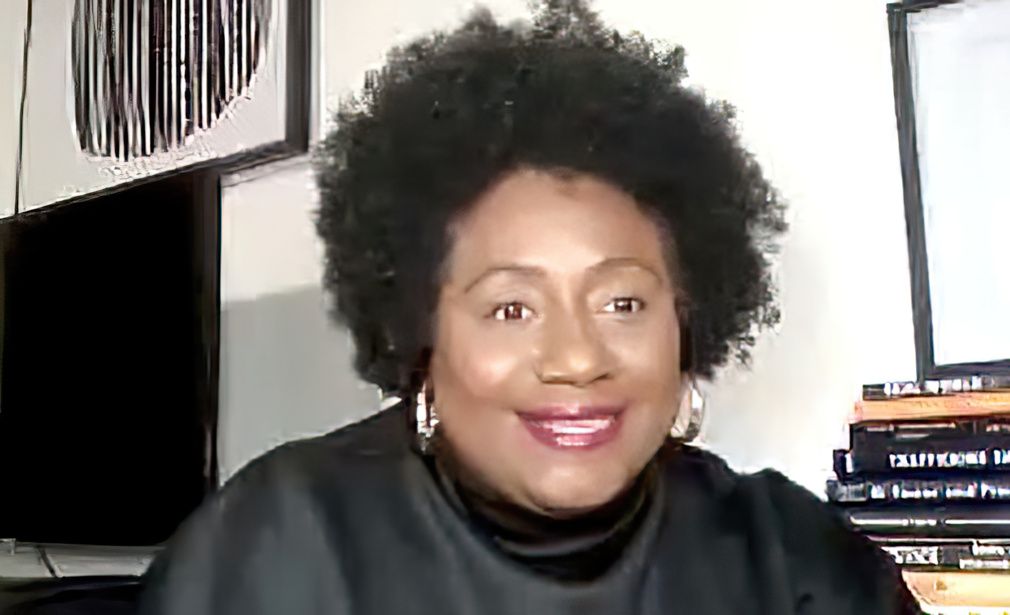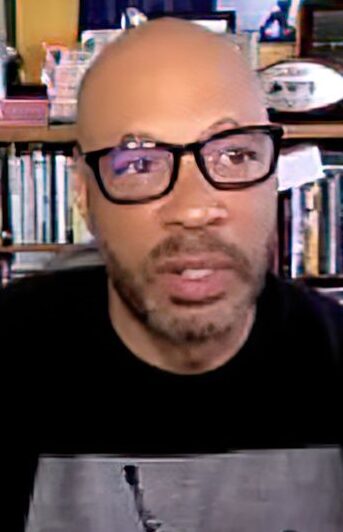Factors Include Rights Laws, Social Class, Education
Ousted as NFL Reporter, Trotter Recalls Howard U. Training
Homepage photo credit: European Network Against Racism
Journal-isms Roundtable photos by Don Baker/Don Baker Photography Group
Support Journal-ismsDonations are tax-deductible.
Fifty-four people attended the March 28 Zoom session, with 72 others watching on Facebook as of April 6 and another 34 on YouTube by then. (Credit: YouTube)
Factors Include Rights Laws, Social Class, Education
By Isaiah Jerome Lewis Poole
Historically Black Morgan State University will be studying the impact of artificial intelligence on Black communities.
The University of Virginia is creating a national database of AI-driven police surveillance programs.
 Leroy Chapman Jr. (pictured), the newly named first Black editor-in-chief of the Atlanta Journal-Constitution, says he is particularly concerned about the impact of AI on his city’s low-income African Americans.
Leroy Chapman Jr. (pictured), the newly named first Black editor-in-chief of the Atlanta Journal-Constitution, says he is particularly concerned about the impact of AI on his city’s low-income African Americans.
Black experts on artificial intelligence are working on multiple fronts to address the impact of this fast-spreading technology on communities of color. They say these populations should not continue to bear the brunt of AI’s negative consequences while being deprived of its potential benefits.
Speaking at a Journal-isms Roundtable discussion March 28, those experts also saw a role for journalists, as reporters and as opinion writers.
Fifty-four people attended the Zoom session, with 72 others watching on Facebook as of April 6 and another 34 on YouTube by that time. You can watch the embedded video above or on the YouTube page.
Attendees left using such phrases as “unbelievably rich.”
“I am still haunted by last night’s panel discussion about the future, data, AI and the whole damn thing,” said another, who said she shuddered as she wrote, watching an NBC News segment on the growing trend of people cloning others’ voices.
 Nicol Turner Lee (pictured), a senior fellow in governance studies at the Brookings Institution’s Center for Technology Innovation, was one speaker homing in on journalists. “First and foremost, we have to determine the agility of our civil rights laws, our fair housing, credit and other equal opportunity statutes to ensure that they actually apply in a digital domain.
Nicol Turner Lee (pictured), a senior fellow in governance studies at the Brookings Institution’s Center for Technology Innovation, was one speaker homing in on journalists. “First and foremost, we have to determine the agility of our civil rights laws, our fair housing, credit and other equal opportunity statutes to ensure that they actually apply in a digital domain.
“I’ve been pressing that as a policymaker, that we need a commission on that because we keep skirting around the issue that these structural grievances actually occur.
“I’ll give you a great example,” Lee continued. “I sit on the National Academies of Science Board research commission on the use of facial recognition technology by law enforcement. And the hardest challenge that we’ve had is . . . I’m gonna be honest, is sitting there with folks [who] don’t understand the lived experiences of people of color who are daily subjected to the terror and trauma of law enforcement.
“They see this tool as helping in the investigative and prosecutorial process. I see this tool as enabling law enforcement to further weaponize our communities. And so again, without being at the table, you can’t bring that up. But more importantly, my third point: Without due diligence in terms of regulation or accountability, these technologies will just run wild.”

Chapman cited the AJC’s location in a region that is not only home to leading companies but at the center of key challenges around race and class inequity.
“We don’t have enough people covering technology in our newspaper, and that’s one of the things that we want to do and grow,” Chapman said. The technology should also be viewed as an education issue, he said.
“I think this . . . will allow me to have a conversation in my newsroom about us learning a little bit more and being, I think, more curious about some of the governmental and commercial applications of this,” the editor said, as well as keeping people informed about how data is being used to “make even more nuanced decisions that will be against you.”
Despite its reputation as a “Black Mecca,” Chapman said, “The one thing that Atlanta does suffer from is that there is untapped talent.” While the city has attracted many Black professionals like Chapman — in his case, from South Carolina — “we do that while we’ve got folks who were born here and their social mobility is among the worst in the country.”
As a father with three children, Chapman said he recalled leaving a Poynter Institute discussion on technology disturbed by the projection that those born today would have to change careers on average nine times because of AI advances. That has implications for an education system that needs to accommodate lifelong learners. “This conversation helps me to think about going back to my newsroom and some of the things that we definitely have to address when it comes to schools.”
Jacqueline “Jackie” Jones, dean of the School of Global Journalism and Communications at Morgan State University, said she is working with the university’s School of Engineering on a project that would look at the impact of AI on the media industry. The university recently received grants from both the state of Maryland and the U.S. Department of Defense that will help fund AI-related research.
 One project pursued by Renee Cummings (pictured), assistant professor of data science at the University of Virginia and its first “data activist in residence,” is an algorithm that measures “how much digital force is being deployed against you” in each community. She has collected and analyzed surveillance technologies deployed by governments across the nation. “It’s a way to give communities and individuals an opportunity to understand surveillance technology and to understand that digital force is real force.”
One project pursued by Renee Cummings (pictured), assistant professor of data science at the University of Virginia and its first “data activist in residence,” is an algorithm that measures “how much digital force is being deployed against you” in each community. She has collected and analyzed surveillance technologies deployed by governments across the nation. “It’s a way to give communities and individuals an opportunity to understand surveillance technology and to understand that digital force is real force.”
When that project is complete, Cummings told the journalists, “I really want to share that technology with you and for you to play with it and get a sense of how important it is.” Law enforcement should “realize they’re procuring a lot of technology that’s being deployed, but it’s doing nothing to reduce crime and definitely nothing to enrich and enhance quality of life and build up communities.”
( Calvin D. Lawrence, (pictured) a distinguished engineer at IBM who serves on its corporate AI ethics board, promised that his upcoming “Hidden in White Sight: How AI Empowers and Deepens Systemic Racism” will “demystify the algorithmic black box” and its built-in biases, while giving readers tools “to fight against it.”
Calvin D. Lawrence, (pictured) a distinguished engineer at IBM who serves on its corporate AI ethics board, promised that his upcoming “Hidden in White Sight: How AI Empowers and Deepens Systemic Racism” will “demystify the algorithmic black box” and its built-in biases, while giving readers tools “to fight against it.”
Lawrence underscored the lack of diversity in his field. “Out of the hundreds and hundreds of applications I’ve built, I’ve never been on a team of more than two Black people on a design team, ever,” he said, adding that these teams usually comprise 15 to 20 people.
Some technicians of color have come together under names such as Black in AI, Distributed Artificial Intelligence Research Institute and Black Women In Artificial Intelligence.
Angle Bush, who founded the latter group in 2020, told the Roundtable that she does not want Black women “simply to be consumers, but to be creators as well.” To that end, her organization has partnered with such companies as Nvidia, Amazon and ChapterOne Technologies, to “make sure that we are deeply embedded in the ecosystem of artificial intelligence.”
“They call it the fourth industrial revolution, and you can’t have a revolution without Black women,” Bush said.

Bush warned against the creation of “digital humans,” such as those appearing in television shows in China. (This issue grabbed national attention when it was disclosed that Levi’s was using AI-generated models of color for its clothing when it could have opted to hire real models of color instead.) “If I create digital humans, AI of all different races, guess what? I don’t have to answer that call of diversity, equity and inclusion, because I have that representation in my newscast,” she said.
“So when we are talking about this, and I talked about this” at the National Association of Black Journalists convention “last year in Las Vegas, we have to be careful, those of you who are journalists, to look at what is happening with ChatGPT, with [Google] Bard and all these different AI initiatives that are coming up. …. Make sure you are embedded in the system and are prepared to pivot.”
Cummings had a caveat. “I don’t want anyone to just leave here thinking that this technology is something to be feared. It is something to know and something to understand. You need to be aware of it. You need to understand the ethical questions. You need to understand the limitations of the technology. It’s not magic. It is just technology.”
Ousted as NFL Reporter, Trotter Recalls Howard U. Training
Jim Trotter (pictured), the NFL Network reporter whose contract was not renewed in the wake of his repeated questioning of NFL Commissioner Roger Goodell on NFL diversity commitments, told the Journal-isms Roundtable that his persistence in holding Goodell’s feet to the fire, at the cost of his job, grew out of values instilled in him in the mid-1980s as a journalism student at Howard University.
 “I had two professors who were, to this day, you know, I still think about them. They’re both no longer with us. One was Sam Yette, and one was Dr. Lee Thornton.
“I had two professors who were, to this day, you know, I still think about them. They’re both no longer with us. One was Sam Yette, and one was Dr. Lee Thornton.
“And they were tough, you know? Yeah. There were times I would go back to my dorm room, you know, just wondering, do I have what it takes? But now, years later, obviously I can see, you know, the method to their madness, so to speak.
“I just believe that the role of a journalist is to hold those in power accountable, and to make sure that their actions reflect their words. And so when the NFL repeatedly says that its core principles are diversity, equity and inclusion, and the data does not reflect that, then they need to be asked about it.”
 The incident that crystallized his passion about representation in sports newsrooms took place while he was a reporter at ESPN observing the coverage of then-San Francisco 49ers quarterback Colin Kaepernick’s (pictured) 2016 decision not to stand during the playing of the national anthem.
The incident that crystallized his passion about representation in sports newsrooms took place while he was a reporter at ESPN observing the coverage of then-San Francisco 49ers quarterback Colin Kaepernick’s (pictured) 2016 decision not to stand during the playing of the national anthem.
”ESPN had me cover the game. And as I’m doing a live hit for ‘Sportscenter’ before the game, the sports anchor or the host back in Bristol, Connecticut, is talking about the situation and is framing it in such a way that it sounds as if Colin is being disrespectful to the flag, disrespectful to the military, yadda, yadda, yadda.
“And as I’m listening to him, in my head, I said, at that point, you gotta make a decision. Either you’re going to go along and let it be framed in this way, or you’re going to correct the host and talk about what’s really going on.
“And it was at that point, I said, ‘I am going to frame this in the way that it is meant to be framed.’ And from that point forward, what I have said to myself is that whatever time I have left in this business, my purpose is simply to give a voice to the voiceless and to continue to speak truth to power, and to hold those in power accountable. And I’m not deviating from that.”
On Monday, Trotter disclosed that he had been offered a three-month severance package, with a non-disclosure agreement. He said he declined.
- Rebecca Aguilar, Twitter: “The role of a journalist is to hold those in power accountable…”says @JimTrotter_NFL . . .” (video clip)
- Amateur Photographer: The human cost of artificial intelligence in photography (Dec. 23, 2022)
- Dina Bass, Bloomberg: Bill Gates Sees GPT’s AI as Revolutionary Tech Breakthrough (March 21)
- John Eggerton, nexttv.com: White House Eyes AI, Algorithmic Regulation (April 11)
- Sarah Grevy Gotfredsen, Columbia Journalism Review: Q&A: How can artificial intelligence help journalists? (March 17)
- Kashmir Hill, New York Times: Which Stores Are Scanning Your Face? No One Knows. (March 10, updated March 13)
- Lester Holt, Tristan Harris and Aza Raskin, NBC News: AI ‘race to recklessness’ could have dire consequences, tech experts warn in new interview (March 22) (video)
- Tatum Hunter, Washington Post: 3 things everyone’s getting wrong about AI (March 22, updated March 30)
- Maya Lora, Baltimore Sun: A University of Maryland professor wants to expose the hidden bias in AI, and then use it for good (Sept. 14, 2022)
- Chris Moran, the Guardian: ChatGPT is making up fake Guardian articles. Here’s how we’re responding
- Felix M. Simon, Oxford Internet Institute, University of Oxford: AI will not revolutionise journalism, but it is far from a fad (March 6)
- Stuart A. Thompson, Tiffany Hsu and Steven Lee Myers, New York Times: Conservatives Aim to Build a Chatbot of Their Own (March 22, updated March 25)
- Janette Neuwahl Tannen, University of Miami: Black Women in Artificial Intelligence founder offers strategies to increase representation (Oct. 19, 2022)
- Pranshu Verma, Washington Post: AI can draw hands now. That’s bad news for deep-fakes (March 26)
- James Vincent, the Verge: What a machine learning tool that turns Obama white can (and can’t) tell us about AI bias (June 23, 2020)
To subscribe at no cost, please send an email to journal-isms+subscribe@groups.io and say who you are.
Facebook users: “Like” “Richard Prince’s Journal-isms” on Facebook.
Follow Richard Prince on Twitter @princeeditor
Richard Prince’s Journal-isms originates from Washington. It began in print before most of us knew what the internet was, and it would like to be referred to as a “column.” Any views expressed in the column are those of the person or organization quoted and not those of any other entity. Send tips, comments and concerns to Richard Prince at journal-isms+owner@
View previous columns (after Feb. 13, 2016).
View previous columns (before Feb. 13, 2016)
- Diversity’s Greatest Hits, 2018 (Jan. 4, 2019)
- Book Notes: Is Taking a Knee Really All That? (Dec. 20, 2018)
- Book Notes: Challenging ’45’ and Proudly Telling the Story (Dec. 18, 2018)
- Book Notes: Get Down With the Legends! (Dec. 11, 2018)
- Journalist Richard Prince w/Joe Madison (Sirius XM, April 18, 2018) (podcast)
- Richard Prince (journalist) (Wikipedia entry)
- February 2018 Podcast: Richard “Dick” Prince on the need for newsroom diversity (Gabriel Greschler, Student Press Law Center, Feb. 26, 2018)
- Diversity’s Greatest Hits, 2017 — Where Will They Take Us in the Year Ahead?
- Book Notes: Best Sellers, Uncovered Treasures, Overlooked History (Dec. 19, 2017)
- An advocate for diversity in the media is still pressing for representation, (Courtland Milloy, Washington Post, Nov. 28, 2017)
- Morgan Global Journalism Review: Journal-isms Journeys On (Aug. 31, 2017)
- Diversity’s Greatest Hits, 2016
- Book Notes: 16 Writers Dish About ‘Chelle,’ the First Lady
- Book Notes: From Coretta to Barack, and in Search of the Godfather
- Journal-isms’ Richard Prince Wants Your Ideas (FishbowlDC, Feb. 26, 2016)
- “JOURNAL-ISMS” IS LATEST TO BEAR BRUNT OF INDUSTRY’S ECONOMIC WOES (Feb. 19, 2016)
- Richard Prince with Charlayne Hunter-Gault, “PBS NewsHour,” “What stagnant diversity means for America’s newsrooms” (Dec. 15, 2015)
- Book Notes: Journalists Follow Their Passions
- Book Notes: Journalists Who Rocked Their World
- Book Notes: Hands Up! Read This!
- Book Notes: New Cosby Bio Looks Like a Best-Seller
- Journo-diversity advocate turns attention to Ezra Klein project (Erik Wemple, Washington Post, March 5, 2014)

